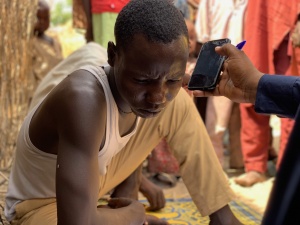People affected by the conflict in linguistically diverse northeast Nigeria need to give and receive critical information in multiple languages. Options for doing so are currently limited, but rethinking how humanitarians use audio messaging to reach their intended audiences could change that.
Research shows that audio is the most widely understood communication format among internally displaced people in northeast Nigeria. Nearly 65 percent of the internally displaced population in Borno prefer to receive information by radio, according to IOM’s DTM data.
Between October 2018 and January 2019, Translators without Borders (TWB) reviewed humanitarian approaches to audio communication in Borno State. We concluded that expanding multilingual audio programming is both necessary and achievable. To achieve that, humanitarian communications specialists should:
- Collect improved data on the geographic and linguistic coverage of radio
programs and on audience preferences - Expand Kanuri content in radio programs
- Provide short summaries of Hausa and Kanuri content in other local languages
- Translate key messages and programs into local languages, and prerecord
them for local playback - Provide audio and multilingual feedback mechanisms
Download and read the full report here.

